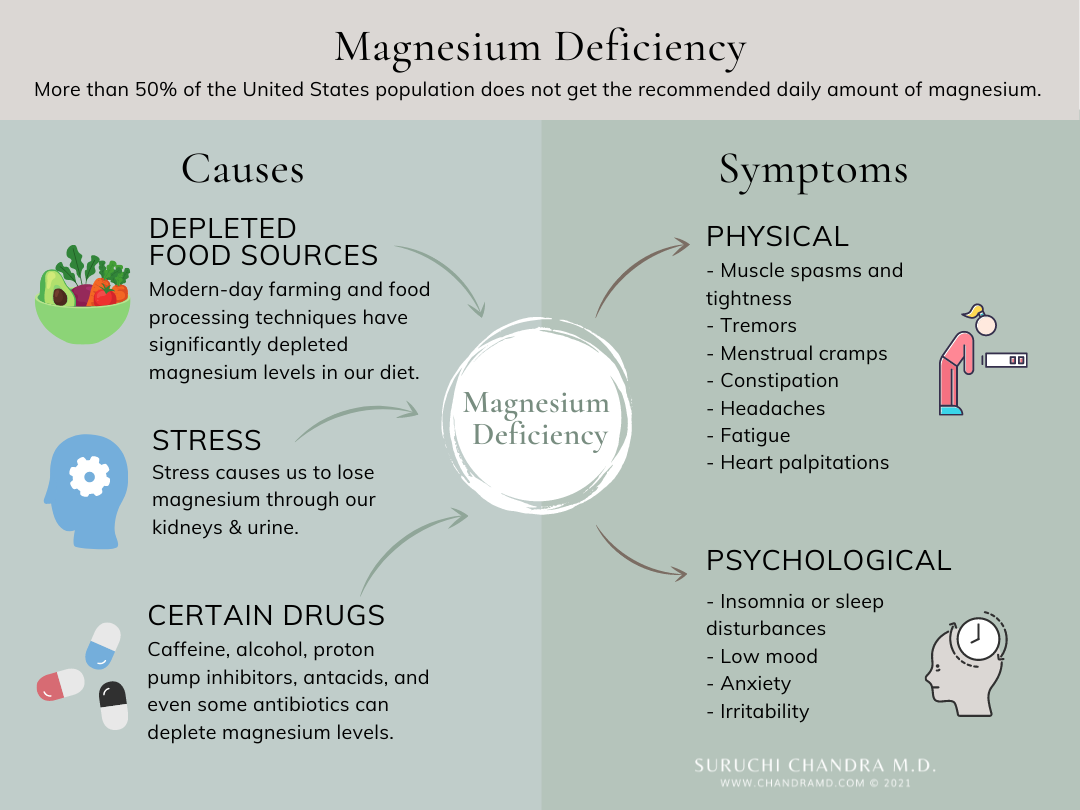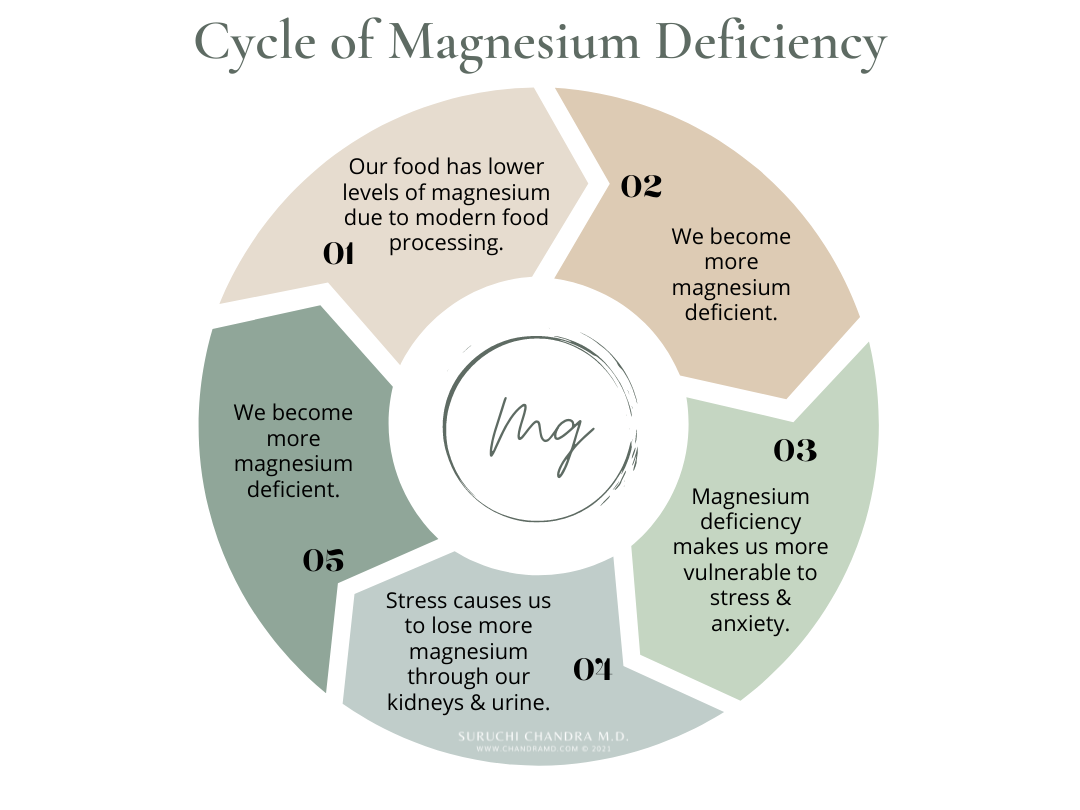Anxiety, sleep problems, fatigue, and headaches can all share the same starting point: magnesium deficiency. In fact, more than 50% of the population in the United States doesn’t get the recommended daily amount of magnesium. Despite this, magnesium deficiency is rarely diagnosed. Addressing this mineral deficiency can help relieve symptoms in the short term and reduce the risk of serious chronic diseases in the long run.
In my practice, magnesium supplements get some of the best feedback from our patients, and many often stay on them after finishing treatment with our clinic. In this article, we’ll discuss the following questions:
- What is magnesium good for?
- What are the signs and symptoms of magnesium deficiency?
- What causes magnesium deficiency?
- How much magnesium do we need?
- Is there a magnesium deficiency test?
- What foods have magnesium?
- Will magnesium supplements help me?
What is magnesium good for?
Like calcium and iron, magnesium is an essential mineral that has widespread effects on the body. Magnesium is involved in 80% of the body’s metabolic reactions. One of its most important roles is in energy production in the body, so it’s not surprising that low magnesium levels can result in fatigue or feeling tired.
Magnesium benefits for the body
Magnesium helps form the foundation for good health and has a stabilizing effect on the body. This important mineral is needed to:
- Build strong bones
- Relax muscles
- Stabilize heart rhythm
- Regulate blood pressure
Magnesium benefits for the Brain
Magnesium is known as “the original chill pill” because it plays an important calming role in the brain. It acts as the brake of our nervous system, keeping us from being stuck in overdrive. In other words, magnesium can help prevent us from feeling hyperactive or anxious during normal, daily activities.
Magnesium can also play a protective role in the brain. Studies show that it may shield brain cells from biological stress and cognitive decline.
What are the signs and symptoms of magnesium deficiency?
Because magnesium is involved in so many pathways, it is not surprising that magnesium deficiency symptoms can occur throughout the body and brain:
| Physical Symptoms | Psychological Symptoms |
| Muscle spasms and tightness Muscle weakness Tremors Menstrual cramps Constipation Headaches Fatigue Palpitations (racing or pounding heartbeat) Loss of appetite | Insomnia or sleep disturbances Low Mood Anxiety Irritability |
In addition to these signs of magnesium deficiency, certain lab findings such as low potassium levels or calcium levels may also indicate a magnesium deficiency.
Chronic magnesium deficiency can lead to other diseases.
Over time, magnesium deficiency may increase the risk for a number of more serious conditions:
| Chronic Medical Conditions | Psychiatric Disorders |
| Type 2 diabetes PMS Arrhythmia (abnormal heart rhythm) Heart disease High blood pressure Migraine headaches Osteoporosis Seizures | Depressive disorders Anxiety disorders ADHD |
What causes magnesium deficiency?

You might be surprised to hear that over half of the United States population does not get the recommended daily amount of magnesium. This is because modern-day life makes it difficult to get enough of this important mineral through three main factors:
- Magnesium in our food sources has dramatically decreased over the last 70-100 years. Modern farming processes have depleted minerals from the soil. Some food processing techniques can also strip away up to 80% of the magnesium levels in grains.
- Stress causes us to lose more magnesium through the kidney and urinary excretion. This means that long periods of stress can result in significant magnesium depletion.
- Certain medications, drugs, and substances can make some people at higher risk for magnesium deficiency. This includes people who consume alcohol or caffeine or those who take proton pump inhibitors (ex. Prilosec, Zantac, Prevacid), antacids, high-dose calcium supplements, and some antibiotics.
Some chronic gastrointestinal conditions (ex. celiac disease, Crohn’s disease, chronic diarrhea) can also impact the absorption of minerals and contribute to magnesium deficiency.
Magnesium deficiency and stress: The vicious cycle
Unfortunately, magnesium deficiency can have a spiraling effect.
If we don’t get enough magnesium because of modern farming and processing techniques, we can easily become magnesium deficient. Low magnesium levels can make us more vulnerable to high levels of stress and anxiety. A heightened stress response can then cause us to lose even more magnesium through our kidneys. The cycle of magnesium deficiency continues as a downward spiral of increasing stress and depleted magnesium levels.

Since so many of us are magnesium deficient, let’s review the recommended dietary allowance, lab testing, and best sources of magnesium.
How much magnesium do we need?
The recommended daily intake of magnesium is 400 – 420 mg/day for men and 320 – 360 mg/day for women. However, we likely need more to feel our best and prevent chronic medical conditions.
In the past when our food supply had higher magnesium content, people likely used to consume 500 to 600 mg/day. However, the average intake has fallen to about 200 to 275 mg/day. The prevalence of magnesium deficiency in our population may be one of the reasons why chronic illnesses such as diabetes and heart disease are on the rise.
Is there a magnesium deficiency test?
While a blood test for magnesium is available, it is not useful for diagnosing most cases of magnesium deficiency.
Magnesium is mostly stored in our bones and organs. In fact, our blood levels account for less than 1% of our total magnesium levels. This means that even if your blood levels of magnesium are in the normal range, you may still be magnesium deficient and suffer from related symptoms.
Because there is no gold standard blood test for magnesium deficiency as there is for iron deficiency, it often goes undiagnosed. When blood or serum levels of magnesium are low, this indicates a profound deficiency known as hypomagnesemia.
How can I tell if I’m magnesium deficient?
In most cases, blood tests cannot help us determine if we have suboptimal levels of magnesium, so we should ask ourselves:
- Do I have several symptoms related to magnesium deficiency?
- How much magnesium am I consuming through my diet?
- Am I taking any medications that could interfere with magnesium absorption?
- Am I under significant stress that could result in more excretion of magnesium?
If you think you may be magnesium deficient, consider increasing your intake through some simple solutions like eating the right foods or asking your doctor about supplements.
What foods have magnesium?
According to the National Institute of Health, there are many magnesium foods that we can easily find. The most magnesium-rich foods include:
- Seeds (pumpkin, chia)
- Nuts (almonds, cashews, peanuts)
- Leafy greens (spinach, edamame)
- Grains (cereal, brown rice, oatmeal)
Will magnesium supplements help me?
While a healthy diet should be the starting point to raising magnesium levels and other essential minerals, it can be difficult to get enough from food because of modern-day practices and certain pre-existing conditions. For this reason, those under a great deal of stress or with certain health conditions may benefit from magnesium supplements.
What is the best magnesium supplement?
Magnesium supplements come in many different forms, such as magnesium citrate or oxide. Choosing the right form of magnesium matters and depends on many individualized factors, including your symptoms and genetics. Magnesium glycinate, taurate, and malate are forms that are better absorbed and bioavailable.
What is the dosing for magnesium?
Nutritional labels typically list 300mg, which is similar to the recommended daily allowance. However, clinical experience and some studies show that people with medical and psychological conditions may need more.
In general, magnesium supplements are well tolerated and safe. However, do not start any magnesium supplements without speaking to a medical provider. Patients with kidney issues as well as some other medical conditions are at risk for toxicity or hypermagnesemia.
There are many potential magnesium benefits for better health.
Essential minerals like magnesium deserve more attention in healthcare. Getting enough of these minerals can help relieve troubling symptoms and protect us from more serious chronic illnesses. Magnesium is foundational to good health and should be considered more often by patients and doctors.
In an upcoming article, we’ll discuss the various forms of magnesium supplements and the evidence behind them.
References
1. “The Importance of Magnesium in Clinical Healthcare” – Scientifica (2017), DOI: 10.1155/2017/4179326
2. “Challenges in the Diagnosis of Magnesium Status” – Nutrients (2018), DOI: 10.3390/nu10091202
3. “Subclinical magnesium deficiency: a principal driver of cardiovascular disease and a public health crisis” – Openheart (2017), DOI: 10.1136/openhrt-2017-000668
4. “Magnesium: Are We Consuming Enough?” – Nutrients (2018), DOI: 10.3390/nu10121863
5. “Magnesium Deficiency Questionnaire: A New Non-Invasive Magnesium Deficiency Screening Tool Developed Using Real-World Data from Four Observational Studies” – Nutrients (2020), DOI: 10.3390/nu12072062
6. “Magnesium Status and Stress: The Vicious Circle Concept Revisited” – Nutrients (2020), DOI: 10.3390/nu12123672
7. “About the misdiagnosis of magnesium deficiency” – American College of Nutrition (2004), DOI: 10.1080/07315724.2004.10719416
The information and any products mentioned in this article are not intended to diagnose, treat, cure, or prevent any disease. The information provided is for educational purposes only and not intended to replace the relationships with your physician(s). Before initiating any conventional or integrative treatments, please first consult with a licensed medical provider. Please review references cited at the end of article for scientific support of any claims made.
Suruchi Chandra, MD
By
October 12, 2021
|







